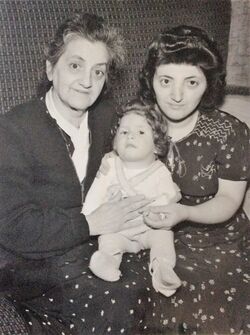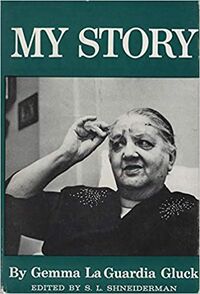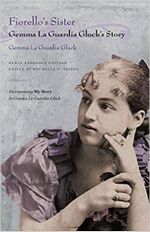Richard Denes (M / Hungary, 1944-2020), Holocaust survivor
Richard Denes (M / Hungary, 1944-2020), Holocaust survivor
- KEYWORDS : <Ravensbruck> -- <United States>
- MEMOIRS : My Story (1961), by Gemma La Guardia Gluck
Biography
Richard Denes was born 1944 in Budapest, Hungary. He was the grandson of Gemma La Guardia Gluck, the sister of New York City Mayor Fiorello La Guardia (1934-1945). Richard Denes and his mother Yolanda Gluck Denes were deported from Budapest to the Ravensbrück concentration camp in August 1944. When the three of them were transferred to a Gestapo prison in Berlin in April 1945, Richard was so weak that he could not hold his head by himself. His father perished in the Holocaust. As the Soviet Army approached, they were released from prison. They lived with a German family in Berlin for a year and were able to move to Copenhagen in May 1946 and then to New York in May 1947, where Richard Benes later worked as a computer technician.
He died on March 29, 2020 as a result of an infection with Covid 19 in Yonkers NY.
Memoirs
- Gemma La Guardia Gluck, My Story, ed. S. L. Shneiderman (1961). Repr. Fiorello's Sister: Gemma La Guardia Gluck's Story, ed. Rochelle G. Saidel (Syracuse University Press, 2007). See also Rochelle G. Saidel. "Gemma La Guardia Gluck: A Jewish American." In The Jewish Women of Ravensbruck Concentration Camp (Madison, WI; University of Wisconsin Press, 2006), 109-120.
"Born in 1883 in the Dakota Territories, Gemma LaGuardia Gluck was the daughter of an American bandleader and European mother of aristocratic Italian Jewish lineage. She was the sister of beloved New York Mayor Fiorello LaGuardia. Gemma and her Hungarian Jewish husband were living in Budapest in 1944 when Nazi troops stormed the city. The Gestapo arrested her as a political prisoner because she was LaGuardia's sister. In her own words she recounts the plight of Budapest's Jews, deportation to Mutthausen with her husband, and enslavement at Ravensbruck, a notorious concentration camp for women. With painful sensitivity she chronicles unspeakable evil, kindness at great risk, and courage among women in a prefeminist world. Most of Gemma's story tells of the ordeal she and her family endured during the Holocaust and after in displaced persons camps. But she also recalls girlhood in the Old West, Native Americans befriended by her mother, international travel with her father, and her brother's ambitions and rise to success. She remembers fondly balmy days in prewar Budapest, and her return to postwar New York City where she lived until her death in 1962. Her story, first published in 1961, has been out of print for decades. This revised edition contains a new prologue, epilogue, photos, and annotated material inspired by recently discovered notes and letters."--Publisher description (1961).
"Born in 1881 in New York City, Gemma La Guardia Gluck was the daughter of Italian immigrants, a mother of prestigious Italian Jewish lineage and a father who became a U.S. army bandleader. She was the sister of beloved New York City mayor Fiorello La Guardia. Gemma and her Hungarian Jewish husband were living in Budapest in 1944 when Nazi troops stormed the city. Eichmann and Himmler ordered her arrest as a political hostage because she was La Guardia's sister. Gluck recounts the plight of Budapest's Jews, deportation to Mauthausen with her husband, imprisonment at the notorious Ravensbriick women's concentration camp, and difficulties as a displaced person in postwar Berlin. With compassion and sensitivity she chronicles unspeakable evil, kindness at great risk, and courage among women in a prefeminist world. She also recalls her girlhood years spent in the Old West, native Americans befriended by her mother, her family's return to Europe, and her brother's ambitions and rise to success ... Gemma's memoir is a story of a wise and strong woman who remained optimistic and resourceful, even when life was much less than fair ... Her story, first published in 1961, has been out of print for decades. This revised edition contains a new prologue, epilogue, photos, annotated material, and recently discovered letters between Gemma and Fiorello."--Publisher description (2007)


